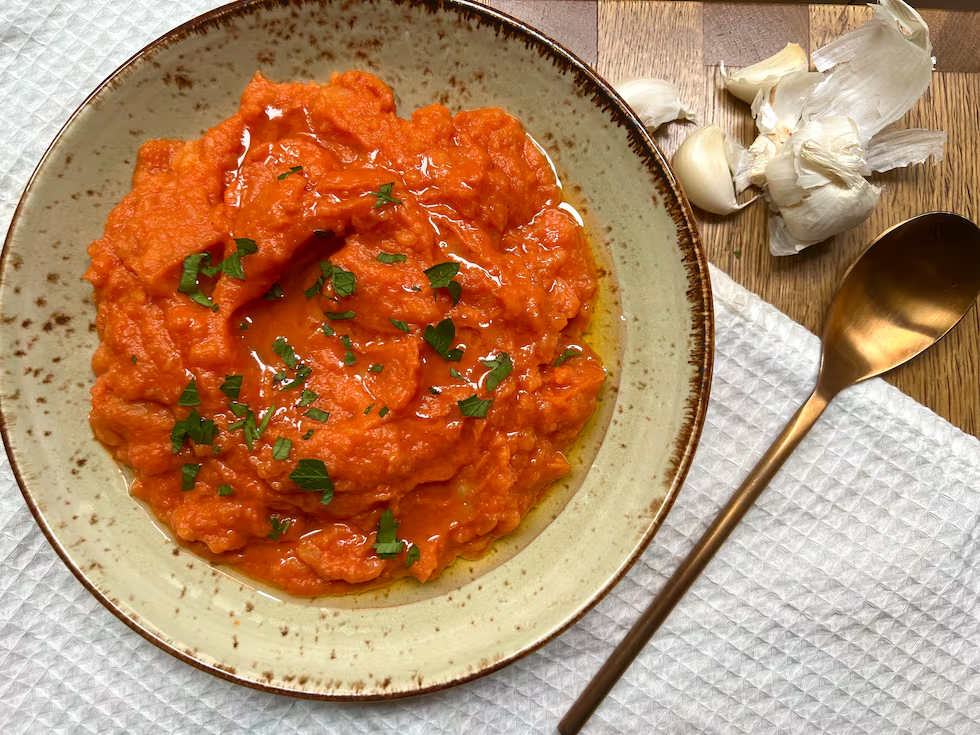A base of potato, onion, tomato, dried pepper, cumin and garlic that allows for almost infinite variations in which fish, paprika or saffron can be added, which was traditionally crushed in a mortar

In the Face of Discouragement: El Comidista Dives into Traditional and Regional Recipes
Once again, we’re stepping into that garden of traditional and regional recipes at El Comidista, a place where you often come out muddied and with your professionalism questioned for not preparing them as someone’s grandmother did (because there are almost as many varieties as there are households). This time, we’re exploring the Almerian version of ajocolorao, a term that refers to different preparations depending on the region.
In Murcia, it refers to a seafood stew with paprika and potatoes—which can also be prepared with snails. There are spartan versions without fish or spices, only using dried peppers and garlic, and others that include saffron, paprika, and fish (cod or skate). To top it off, there is a similar dish from Jaén—the rin ran—which also contains hard-boiled eggs and olives (and in its Murcian version, it doesn’t have potatoes). Since making it to everyone’s taste is entirely impossible, I’ll stick with the vegetarian version because the one with cod reminds me of atascaburras, which we have already published. However, in the recipe, I will explain when to add the fish in case you want to include it. I encourage you to try the result before adding the paprika, as depending on the type of dried pepper used, it can be quite strong.
I have also seen recipes that suggest blending everything together until achieving a cream, and others that recommend serving it cold. I’ve tried both, and personally, I prefer the texture of the crushed potatoes—the starch released when mashing gives it a chewy texture that I don’t like, which is why I don’t use it in vegetable creams either. But the other options are there for those who prefer them.
Time: 40 minutes
Difficulty: Matching that of all the grandmothers in Almería
Ingredients (Serves 4)
- 600 g of potatoes for boiling
- 2 or 3 dried peppers (choriceros or ñoras) (or a generous tablespoon of their pulp in paste)
- 2 ripe pear tomatoes (or one large, about 350 grams)
- 1 large onion
- 1 or 2 garlic cloves
- 3 strands of saffron
- 1/2 teaspoon of ground cumin
- 1/2 teaspoon of smoked paprika (optional)
- 100 ml of extra virgin olive oil
- Salt
- 200 g of desalted cod, skinless and boneless, or 300 g of skate (optional)
Instructions
- Peel and chop the potatoes and onion.
- Peel the tomato and remove the stem.
- Bring a bit of salted water to a boil in a pot. Add the potatoes, onion, whole peppers (if using the pulp in paste, skip this step), and the tomato.
- Cook for about 15 minutes or until the potatoes are tender (if adding cod or skate, do so in the last ten minutes).
- Meanwhile, lightly toast the saffron in a pan or on a spoon over low heat.
- When the potatoes are ready, drain the water (reserving some), remove the stems and seeds from the peppers, and scrape the flesh with a knife. If using fish, set it aside.
- Blend the garlic, cumin, tomato, saffron, pepper flesh, onion, and oil until achieving a fine texture.
Tip: Traditionally, the garlic, cooked tomato, saffron, and whole cumin seeds were ground in a mortar, while the potatoes and oil were mashed in another container, and everything was mixed afterward. - Mash the potatoes with a fork or pass them through a food mill and mix with the previously blended preparation (if it’s too thick, add some of the reserved water). If fish has been used, add it at this moment.
- Taste and decide if you want to add the paprika and adjust the salt if necessary. Mix well again. Let it cool slightly and serve warm or at room temperature.